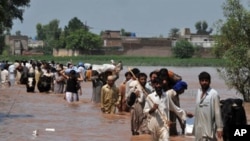Pakistani officials estimate that more than 800 people have been killed since monsoon rains started in earnest across the country in the final week of July. This is the country's worst flooding in more than 80 years.
Pakistani authorities say days of heavy monsoon rains have affected much of the country, especially in the northwest, killing more than 800 people.
Retired Lieutenant-General Nadeem Ahmad is the chairman for Pakistan's National Disaster Management Authority. He tells VOA that this is country's worst flooding since 1929. "We have a huge problem on our hands with regards to [the] management of such of, you know, unprecedented flood that we are having," he said.
Pakistani army spokesman Major-General Athar Abbas spoke with reporters late Saturday about the level of devastation in the northwest. "Virtually, no bridge has been left intact in Swat. All major and minor bridges are gone…destroyed completely," he said.
Officials say about 45 bridges, including major transit ways, have sustained damage throughout the Khyber-Pakhtunkhwa province, while the main highway to China remains underwater.
Authorities also say rescue workers are struggling to reach thousands of stranded villagers.
Major-General Abbas says tens of thousands of troops have rescued more than 19,000 people from marooned areas, using helicopters and boats.
But he cautions that the situation might get worse before it gets better; weather forecasters predict more rain in the coming days. "The level of devastation is so widespread, so large, that it is quite possible that in many areas there are damages, there are deaths, which may not have been reported," he said.
Early Saturday, U.N. officials estimated that the flooding has affected some one million Pakistanis, destroying thousands of homes, roads and farms.
Civil defense official Anwar Ullah Khan says the scope of the disaster is straining the capability of the government.
He says there are not enough facilities from the government side and that his fellow rescue workers do not have vehicles for any emergency situations to take injured people to the hospital. He says they are waiting for medicine, but that in the meantime, they are purchasing medicine with their own money.
Officials say another major concern is the spread of waterborne diseases. The Pakistani government has appealed to the international community for help.
Massive Flooding in Pakistan Kills More than 800




